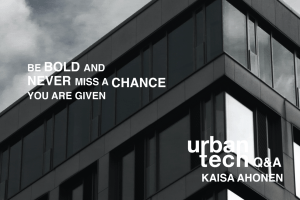A quick Q&A with Dr. Claus Springborg, Executive coach at CoCreation and Lecturer at CBS
How can co-creation and community make cities more sustainable?

Dr. Claus Springborg
Making cities more sustainable is a complex task. To engage successfully with this task, people from many different professional and social backgrounds need to work together. Such collaboration is likely to be characterised by a high level of viewpoint diversity, worldview diversity and diversity of unconscious taken-for-granted assumptions. This inevitably brings the risk of misunderstandings and polarisation which will hamper the work.
Dialogue and co-creation tools can help people suspend their attachment to particular assumptions and viewpoints and use diversity as an engine for productive and generative dialogue and radical innovation in the field of sustainability. In today’s world, most worthwhile projects are undertaken by communities. Community building tools can help build strong communities that are able to meet the complex challenges. Using community building tools increases human bonds in groups in spite of viewpoint diversity. It can make people feel part of something bigger and help them value the way in which clashing world views can result in stronger outcomes – even if the process at times can be uncomfortable.
What do you think our future cities will look like?
One trend that might have an impact is that if working from home becomes the new norm, people may move out of the cities. I could imagine that residential areas in cities might shrink. Another trend is that apartments are becoming smaller. Building energy-neutral houses increases the thickness of the walls and, thus, shrinks the living space. In Copenhagen the outer walls are now included in the square meter price – yet in spite of this square meter prices are still increasing. I imagine that this will lead to an increasing interest in creating living spaces that transform like we already see it in modern architecture in cities like Tokyo. Murphy beds, sliding walls and other furniture that can help transform small living space into whatever is needed at any given moment throughout the day.
What 2-3 books / podcasts would you recommend?
Thinking Fast and Slow by Daniel Kahneman – A great book for understanding where your biases come from and how your mind works.
Sensory Templates and Manager Cognition: Art, Cognitive Science and Spiritual Practices in Management Education by Claus Springborg – Contains a lot of examples of how it is possible to solve seemingly unsolvable managerial problems by becoming aware of how we frame these problems using embodied metaphors. An approach that is very useful for dealing with difficult problems like those related to sustainability.
History of Philosophy without any Gaps – Great podcast for getting exposed to different philosophical systems. I think it is useful to have a rudimentary knowledge of various philosophical positions when dealing with something as complex as sustainability, since this gives you more flexibility of mind and increases your capacity to see the value and reason behind multiple viewpoints at the same time.
What are the skills we will need in 10 years and how can we start developing them?
I think the capacity to form enriching communities that bring meaning and social connection to people will be more and more needed. I also think that the capacity to use viewpoint diversity as fuel for generative dialogue rather than for division, tribalism and polarisation will become one of the number one skills in the future.
Finally, I think that critical thinking skills will become essential. In the age of social media the traditional gatekeepers of information are sidelined. One the one hand, the resulting democratisation of information is great. It means that more people have access to more information, and that more people can make their voice heard. On the other hand, this also means that the traditional gatekeepers of information can no longer perform the function of quality control. Thus, we end up in a situation where the end-user has to develop the capacity to distinguish between high and low quality information, i.e. information that is supported by evidence and information that is not – including misinformation and disinformation.
What advice would you give to those working to make cities more sustainable?
Listen to the opposition. Listen people who are against the project. Even if their concerns are not well formulated, try to help them verbalise their concerns and make their case in the strongest possible way. There is always the possibility that by struggling with concerns you develop new and better ideas and approaches. Don’t let your faith in the goodness of your cause (even when it is truly good) blind you to your own short-comings.
What are you working on now?
I’m working on a number of projects. First, I’m building up a catalogue of leadership development courses focusing on dialogue, co-creation and community building (http://cocreation.dk/).
Second, I’m creating an education for therapists focusing on developing therapeutic tools based on a synthesis of new research findings in the field of cognitive science and spiritual practices from various wisdom traditions (https://www.sensingmind.com/).
Third, I’m looking into the possibility of creating an AI that can do basic sessions aimed at making people aware of the assumptions through which they see and engage with the world – as a form of self-development. I’d be happy to hear from anyone who can connect me with people working in this area.
Finally, I’m looking for possibilities to teach community building capacities and critical thinking skills to young people, as I’m convinced that these skills will be crucial for a sustainable global society. I invite anyone who have such opportunities to get in touch with me.
What is your call to action?
Seek out people who think different from you and have an open and curious conversation. Practice changing your mind.
___________________
Connect with Claus on LinkedIn




